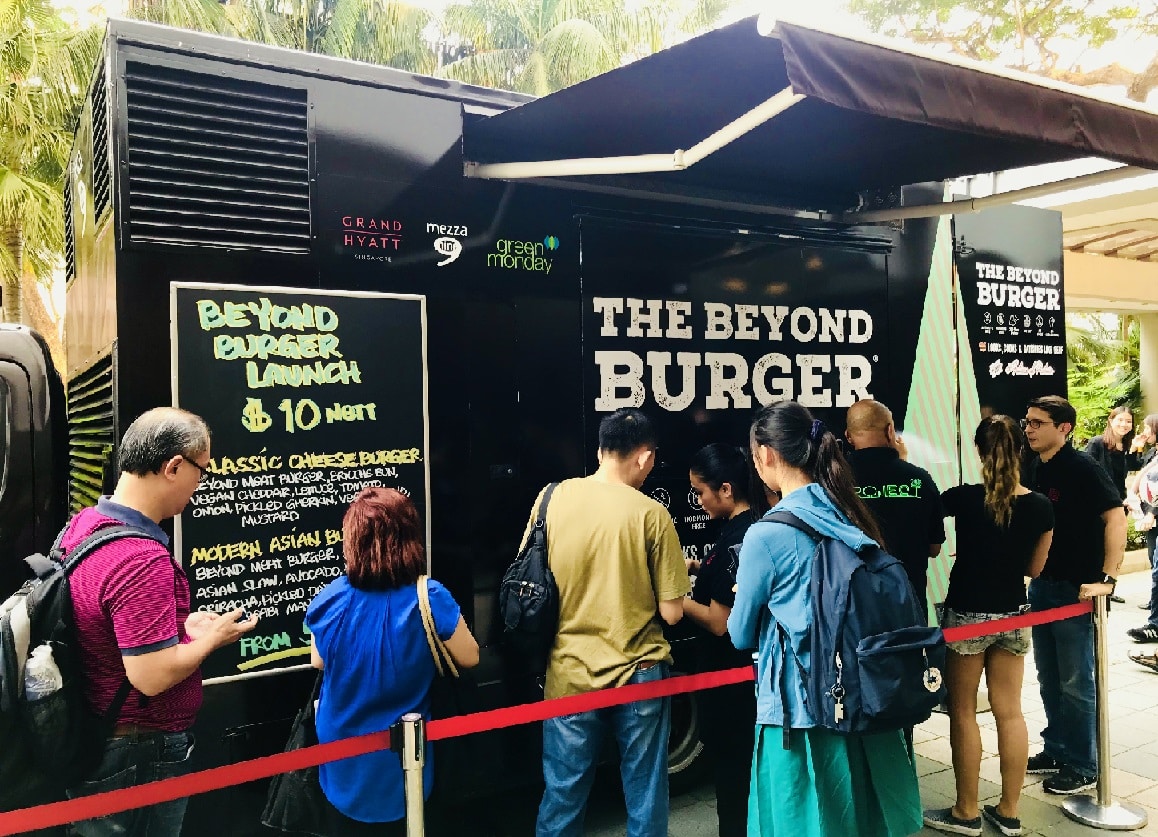Jerome Pagnier started his journey in the food and hospitality business at the age of 16 and has worked in cities such as Los Angeles, New York, Dubai, and Singapore. More than two years ago, Jerome decided to adopt a plant-based lifestyle. Since then, he has been tirelessly striving to change the landscape of the hotel and restaurant industry.
In doing so, he has gained a profound understanding of the incentives that exist for hospitality businesses to include more plant-based options, as well as how to create the most outstanding dining experience for customers and the differences between the European and Asian markets. At the New Food Conference, which takes place in Berlin later this year, Jerome will share his insights on what it takes to successfully bring plant-based products into the food-service sector.
Jerome, why does it make sense for food-service companies to include more plant-based products?
There is a tremendous amount of incentives for food-service companies, and I think most important of all is the reduction of the industry’s negative impact on the environment. Now if this is not incentive enough, which unfortunately is often the case, I have experienced first-hand the marketing power of introducing plant-based alternatives and how it reaches a segment of the population that large brands and conventional foodservice companies struggle to excite.
Not only is it a great marketing tool, but it is also an immediate differentiator. The industry is plagued by companies with the exact same model doing, essentially, the exact same thing, and resorting to price wars or piling extra free benefits onto their loyalty programs to win clients.
This results in damagingly low levels of product and service quality, as well as deepening the sea of sameness. Introducing food tech products, particularly plant-based alternatives, pulls you out of that sea and immediately makes you a forward thinker, a pioneer, a visionary. In my experience, it has been extremely beneficial in terms of marketing, differentiation, and subsequent financial returns.
Based on your experience, what do restaurants and hotels need to change to boost their plant-based menu sale?
There is a really wide range of issues at play, with the most pressing right now being the issue of price. We all understand that at this point in time, plant-based meats tend to be more expensive than conventional meat. What hotel and restaurant chefs need to understand is that, if they are really trying to differentiate themselves with the addition of plant-based items, it is critical to make sure there are no drawbacks at the consumer level.
Essentially, it is important to see these new items almost as their own revenue stream, and at the same time, not to treat them differently to any other items on the menu. In my experience, when launching Beyond Meat among other products at Grand Hyatt Singapore, we paid particular attention to giving no reasons whatsoever to our guests not to try them.
Not only did we ensure the environmental, health and ethical messages were clear and enticing to our guests, but we also charged slightly less than we would for conventional meat. In my opinion, that was the key differentiator. Our margins were lower, but the volume of sales skyrocketed, and made the exercise absolutely worth it.
“Between the financial returns and the marketing coverage, launching high-quality plant-based products was by far the most impactful product integration in decades for the hotel.”
[vc_empty_space height=”20px”]
My advice is: don’t just think short term, play the long game. Look at the integration of these products as a defining moment in the life of your restaurant and, try to make the implementation as impactful as possible. This will go a long way to differentiate you from your competitors, and it will be crucial for the future of your establishment.
What would it take to change the stereotypical idea of a vegan dining experience?
I think there has never been a better time to experiment with the implementation of new, healthy dining options. Today, there is a genuine desire from guests to eat healthy food and to be more environmentally conscious, which plays directly into the hand of vegan dining. However, due to our food mistakes of the past few decades – and more specifically the invention of fast food – a large part of the world’s population sees food as entertainment and can no longer truly enjoy the subtle taste of simple fruits and vegetables. As a vegan myself, I often hear statements such as “you only eat vegetables, that sounds boring” or “I could never do it, I wouldn’t know what to cook”.
Despite how tragic that sounds, considering our ancestors’ diets, we are forced to take that into account and to understand that, while people want to be healthy, they have no desire to compromise on taste. I feel that the trick is to offer decadent, healthy plant-based food. If you are able to serve a vegan meal and have guests leave your restaurant raving about how tasty it was, you won the battle. The matter of the food experience being vegan or not simply becomes secondary.
Finally, I feel that vegan restaurants in general have built a pretty poor reputation for themselves. They are notorious for their lack of ambiance, design, and unfortunately, below-average food. However, there definitely is a shift of sorts taking place, with companies such as VeganJunkFoodBar in The Netherlands, the Green Spot in Barcelona, and the Unity Diner in London, all of which are committed to elevating the plant-based dining experience.

Where do you see the biggest obstacles to plant-based products entering the food-service sector?
I believe there are a couple of obstacles to the use of food innovation by mainstream food-service players. Number one is the fact that the hospitality and restaurant industry can sometimes be stuck in traditions, be judgmental of new technologies, critical of new cooking ideologies, and, subsequently, are often averse to change. And while it seems that this mindset is changing somewhat in certain parts of the world, it is doing so much too slowly, in my opinion.
But where I think the long-term problem really lies is that food-service establishments – as well as retailers – tend to see these products as a ‘one-to-one’ alternative. In other words, if a restaurant already uses a plant-based alternative to beef, for example, they would have no interest in introducing another similar one, unless it is used to replace the former. So, while it is a positive thing that there is now more integration of such products than ever, I am afraid it will be short lived if we can’t get over the hump of this ‘one-to-one’ mindset.
Do you think that food-service professionals will become more accepting of these technologies as time passes?
There will undeniably be more widespread integration of plant-based alternatives in the food industry as a whole in the near future, and we can already see this trend growing. What is more important, in my opinion, is not just how we are going to introduce alternatives, but rather how we are going to fully replace conventionally produced animal products. Considering the current players leading the food-service industry, it would surely seem far-fetched to see them moving away from their current business model and fully switching to a plant-based one. They would run the risk of undermining years, and sometimes decades, of practices, and potentially damaging their reputation in the process. I truly hope they prove me wrong and take the plunge, but it is highly unlikely.
The industry is in dire need of a shake-up, a revolution of its own with new hotel and restaurant brands that do not abide by these traditional belief systems and shatter the status quo with new fully plant-based concepts that rejuvenate the industry. Once enough of these companies become proven financial successes, the big players will start paying attention, and will consequently see the value in transforming their business models.
What is the way to go for restaurants – teaming up with big brands or finding a local supplier?
I believe both work – it just depends on the local market. I would always advocate for using local producers first, because it simply makes sense in terms of carbon footprint and food costs. But it is often hard to find a lot of high-quality local producers in the plant-based space. I also advocate for collaboration with brands, big or small, just like we did when I was in Singapore, a land that is unfortunately not blessed with a lot of plant-based food producers. Today we live in an interconnected world, but one that is in need of collaboration. In my opinion, if we are to be successful in anything we do, we must do it in a collaborative fashion.
If a restaurant or a hotel is looking to implement plant-based products on its menus, my advice would be to leave their egos at the door, and work with food-tech brands in a mutually beneficial manner. By leveraging marketing on both sides of the aisle – local suppliers and popular international brands – the chances of being successful are far greater. Doing so also legitimises the food-tech brand and attracts a new generation of consumers, thus increasing restaurant covers and revenue.
Biofach 2020: plant-based highlights
‘Organic delivers!’ was the motto of Biofach 2020. ProVeg’s Food Industry & Retail experts visited the fair to sample the latest product launches and identify standout products.
How are plant-based products perceived differently in the Asian and European markets?
I think there is a lot to be said about Asia’s acceptance of plant-based products, as well as the region’s desire to invest in cellular agriculture. Countries such as Singapore have been pioneers in the alternative protein space and are putting their money where their mouth is by investing in start-ups at a governmental level. I feel Europe has a big role to play but is still on the back foot.
So far though, Europe has mostly left it to private investors to take it on, and governments haven’t been active enough. I think that Europe has the tendency to fear new food technologies, maybe in some way seeing them as a potential threat to our deep-rooted culinary traditions and ancestral way of life. I am hopeful that it will change rather quickly, given the environmental and health challenges that the world is facing.
What do you think the future of food will look like – in both Asia and Europe?
From what I gather, we are heading towards a food revolution, from both a consumer-behaviour and a food-technology perspective. Consumers in Europe and certain parts of Asia are increasingly aware of the health and environmental repercussions of the omnivore/carnivore diet. That is undeniable. We will continue to see this awareness grow, as people become more conscious of their choices, behaviour change will follow. While other parts of Asia may not have caught on just yet, they have proven they can learn and change much faster than we do.
On the other hand, when rewinding back five to ten years ago and comparing the plant-based alternatives available then with what is on the market nowadays, it makes me think that the plant-based sector has a very bright future ahead. Within the next five years, we will be able to produce plant-based products that are so close to the experience of meat that one will be indistinguishable from the other.
At that point in time, for most, the switch to plant-based foods will be a no-brainer. There will always be people that won’t be able to give up meat and dairy, and for them we have the next generation of food tech – cellular agriculture – which I am really counting on. The only thing that will delay this process will be the acceptance by food-service professionals who may see these technologies as threats to their business models.

You’ve just launched WiseFins, a hospitality company with truly ambitious objectives. Could you explain where the idea came from and what you are aiming to achieve?
WiseFins was born out of the realisation that we all have the responsibility to use our knowledge, expertise, and skills as tools to better the life of all creatures on earth. My co-founder and I come from the hotel industry, and while we loved the 15 years that we both spent working in hospitality, we also came to realize how unsustainable the industry really is, and the negative impact it has on the planet and the health of its patrons, but also the deep ethical issues it raises.
We both decided that we had a role to play in converting it into a clean and compassionate industry. WiseFins conceptualizes, creates, and manages fully sustainable, self-sufficient, health enhancing, and community building hospitality projects through the use of ancient practices, tech integration, and circular economies.
The objective of WiseFins is to build projects that will show the industry as a whole that sustainable self-sufficiency, when put at the centre of the company’s purpose, isn’t only feasible but also financially viable. We aim to be one of the successful companies the large hotel chains keep track of and want to emulate, rendering the current environmentally damaging model irrelevant.
Thank you for the interview, Jerome.
Jerome Pagnier will be speaking at the New Food Conference in August in Berlin. Get your ticket now and become a pioneer in the new age of food.










